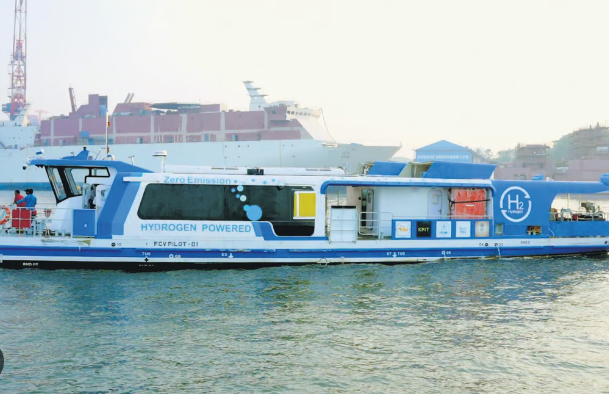India’s First Indigenous Hydrogen Fuel Cell Ferry
On February 29th, 2024, Prime Minister Narendra Modi virtually inaugurated India’s first indigenous hydrogen fuel cell ferry at Kochi Harbor in Kerala. The 24-meter vessel, built by Cochin Shipyard Limited (CSL), marks a major advancement in sustainable transportation for the country.
Vessel Details
Named ‘Suchetha’, the catamaran ferry utilizes an electric propulsion system powered by hydrogen fuel cells. With a capacity to carry 50 passengers, it features air conditioning and comfortable seating. The onboard fuel cells generate power through a chemical reaction between hydrogen and oxygen, with water and heat as the only byproducts.
According to CSL authorities, the ferry has a low draft of 1 meter, allowing it to navigate Kochi’s intricate network of backwaters. Its lightweight yet durable hull gives it a top speed of 12 knots. Safety is also enhanced through fire detection systems and damage stability.
Indigenous Technology
Suchetha’s fuel cells and electric motors have been developed indigenously as part of the Kochi International Water metro project. Led by CSL in partnership with manufacturers such as L&T and Indian Register of Shipping, the endeavor furthers the central government’s vision of “Aatmanirbhar Bharat”.
Speaking at the launch, PM Modi said the ferry showcases India’s potential to harness technology to power sustainable mobility systems. He added that public transport fueled by green energy will expand in both land and water-based urban transportation.
The Prime Minister also called the project a fine example of inter governmental cooperation, applauding the efforts of Inland Waterways Authority of India, Ministry of Ports, Shipping and Waterways, Ministry of Environment and Forests, the Kerala government and other stakeholders.
Benefits
As the country’s first hydrogen-powered vessel, experts believe Suchetha will pave the way for cleaner ferry transit across India’s extensive canal networks. Especially in congested urban pockets, the zero-emission ferry can decongest roads and reduce noise and air pollution.
Additionally, the project creates high-skilled employment opportunities and builds domestic technical capabilities in sustainable marine technologies. Officials feel cost parity with conventional ferries can be attained in the near future with localization of parts manufacturing.
Future Prospects
Drawing confidence from Suchetha’s success, Cochin Shipyard has already invested in constructing 7 more hydrogen fuel cell boats of varying passenger capacities. CSL also looks to tap the international market for clean marine technologies.
In his address, PM Modi stated that India aims to build such low-cost, zero-emission ferry systems in cities across the country under both public and private partnership models.
Category: India Nation & States Current Affairs








